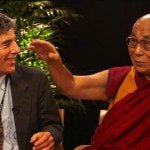Readers here will recall Robert Wright from a series of lectures he gave two years ago via Coursera on Psychology and Buddhism:
- Week one: 1st and 2nd Noble Truths
- two: 3rd and 4th Noble Truths
- three: non-self
- four: what is the “you”?
- five: meditation
That course, while pitched to a wide audience, introduced and explored a number of key Buddhist philosophical and practical points with laudable clarity and insight. Now Robert Wright is continuing what he uncovered in that series with continuing work at Meaningoflife.tv.
In the following clip, Wright interviews Daniel Ingram, a somewhat controversial figure in contemporary Western Buddhist thought. That controversy stems mostly from his claim to be an “arhat” or worthy/awakened one, having realized the true nature of reality in just the same way that the Buddha did. To my knowledge this is still a fairly outlandish thing to claim about oneself, but Ingram’s work has been widely praised by students and practitioners alike and I know of no other particular controversy or reason for worry around his work and thought. His major contribution to contemporary Buddhism can be found in Mastering the Core Teachings of the Buddha: An Unusually Hardcore Dharma Book, where he outlines the practices that led him to his awakening in notable detail.
Controversially here, perhaps, is his claim (around 47 minutes in) that one can master one portion of the 3-fold path (ethics, meditation, wisdom) without much capacity or work in one or two of the others. He says there are connections between these, but not the type that “the dogma” says. Pragmatically though, he continues, people who are decent and abide by good ethics are better to hang out with, do better in meditation, etc.
They also discuss the political implications “Can Buddhism save–or impede the salvation of–the world”? Here Ingram’s answer is optimistic, it can do a great deal for the individual. However, there is still so much going on in the world beyond the meditation cushion that it would be foolish to think meditation alone is going to solve the world’s problems. Here Wright interjects that in his view, the biggest problem in the world is tribalistic thinking, which infects even plenty of Buddhists and Buddhist groups. But meditation, he suggests, allows one to get some distance from that kind of thinking and not get drawn into it.
This is a great interview, especially if you enjoyed the Buddhism and Psychology courses led by Dr. Wright two years ago. It also brings Daniel Ingram to us in a very down to earth way. Highly recommended.
If that embedded video doesn’t work, try here.
Become a supporter of American Buddhist Perspectives“Society is welded in unity with care and concern for one another when generosity is exercised with a warm sense of personal involvement.” – Bhikkhu BodhiKeeping up American Buddhist Perspectives takes a *yuge* amount of time. You can show some love by buying me some coffee – the fuel with which this and the rest of my life is powered. No monthly donations, just give when you can and feel like it. |












